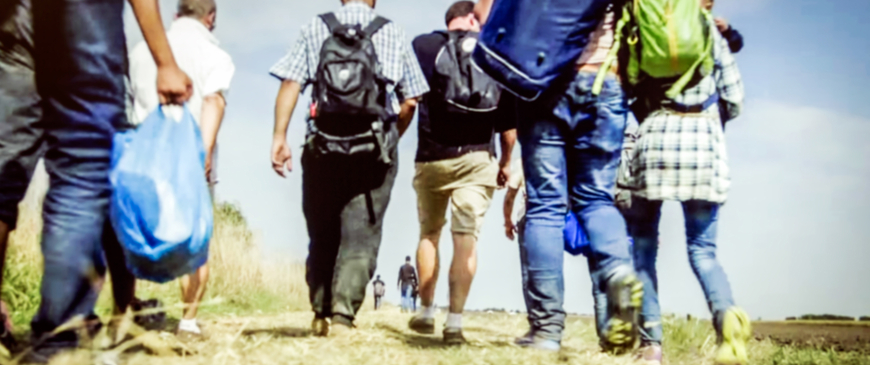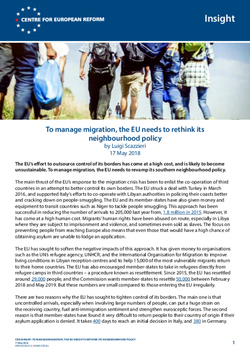
To manage migration, the EU needs to rethink its neighbourhood policy
The EU’s effort to outsource control of its borders has come at a high cost, and is likely to become unsustainable. To manage migration, the EU needs to revamp its southern neighbourhood policy.
The main thrust of the EU’s response to the migration crisis has been to enlist the co-operation of third countries in an attempt to better control its own borders. The EU struck a deal with Turkey in March 2016, and supported Italy’s efforts to co-operate with Libyan authorities in policing their coasts better and cracking down on people-smuggling. The EU and its member-states have also given money and equipment to transit countries such as Niger to tackle people smuggling. This approach has been successful in reducing the number of arrivals to 205,000 last year, from 1.8 million in 2015. However, it has come at a high human cost. Migrants’ human rights have been abused on route, especially in Libya where they are subject to imprisonment and violence, and sometimes even sold as slaves. The focus on preventing people from reaching Europe also means that even those that would have a high chance of obtaining asylum are unable to lodge an application.
The EU’s effort to outsource control of its borders has come at a high cost, and is likely to become unsustainable.
The EU has sought to soften the negative impacts of this approach. It has given money to organisations such as the UN’s refugee agency, UNHCR, and the International Organisation for Migration to improve living conditions in Libyan reception centres and to help 15,000 of the most vulnerable migrants return to their home countries. The EU has also encouraged member-states to take in refugees directly from refugee camps in third countries – a procedure known as resettlement. Since 2015, the EU has resettled around 29,000 people, and the Commission wants member-states to resettle 50,000 between February 2018 and May 2019. But these numbers are small compared to those entering the EU irregularly.
There are two reasons why the EU has sought to tighten control of its borders. The main one is that uncontrolled arrivals, especially when involving large numbers of people, can put a huge strain on the receiving country, fuel anti-immigration sentiment and strengthen eurosceptic forces. The second reason is that member-states have found it very difficult to return people to their country of origin if their asylum application is denied. It takes 400 days to reach an initial decision in Italy, and 380 in Germany. If someone has their asylum application turned down, the appeal process can drag on for several years. Even after a person is issued with an expulsion order, the EU finds it difficult to remove them: in 2017, member-states ordered 516,000 people to leave the EU, but only 211,000 were returned. The difficulty in repatriating those who are not eligible for asylum gives the EU an incentive to make it difficult for migrants to reach the EU.
The EU is quite effective at returning people to countries in the Balkans and Eastern Europe. This is due to a series of ‘readmission agreements’ with those countries, establishing clear procedures for co-operation in identifying their nationals and facilitating their return. Some member-states also have good bilateral co-operation with countries in North Africa, such as Spain with Morocco and Italy with Tunisia. But the EU and its member-states have struggled to return migrants to countries that are not party to a formal readmission agreement, and they include some of the largest countries of origin, for example Nigeria. Nigerians made up around a fifth of those arriving in Italy in recent years, and two-thirds of their applications are rejected. Yet, of 15,660 Nigerian's ordered to leave the EU in 2017, member-states were only able to return 3,705. Similar proportions of people arriving from Guinea, Ivory Coast and Gambia have been returned to their country of origin.
The EU will likely continue to attempt to outsource control of its borders. But this will become increasingly difficult as more and more people try to come to Europe to escape poverty.
Member-states and EU institutions have sought to address this issue by attempting to co-operate more closely with countries of origin on the process of taking back their nationals. The EU has found it difficult to step up co-operation with third countries. Readmission agreements are unpopular with the EU’s partners because they require governments to take back their own citizens, who send home a substantial portion of their earnings and contribute to the economy. The EU’s experience of negotiating such agreements with Morocco, Tunisia and Algeria has shown that third countries often demand a firm commitment to greater legal access to the EU for their own citizens in return for signing a readmission agreement.
More informal co-operation with countries of origin and transit in this region has also proved difficult. Italy, one of the most active member-states, has managed to build links with a range of Libyan groups, but it has had less success and more trouble in countries further south. Italy wanted to deploy forces to Niger and Tunisia to help confront people smugglers, but has put those plans on hold after they met local opposition. As a result of these setbacks, the EU’s migration policy has become more coercive. In early March, the Commission announced that it would seek to use visa policy as leverage, making it more difficult for elites to travel to Europe from countries that do not co-operate enough with returns. It remains to be seen whether this tougher approach will lead to anything more than token increased co-operation by third countries.
Successful co-operation with third countries has been underpinned by large concessions. For example, the March 2016 EU-Turkey migration deal was based on three key concessions: €6 billion in aid, visa liberalisation for Turks who want to visit the EU, and the resumption of accession talks. The EU has been reluctant to make similarly generous concessions to countries in its southern neighbourhood. It has been unwilling to give migrants from this area more opportunities to work legally in the EU. Member-states are reluctant to open up more legal routes and the EU’s Blue Card scheme, which offers work visas for highly skilled migrants, has not had broad take-up, with Germany responsible for the majority of the 68,000 issued since the start of the scheme in 2012. Furthermore, the EU’s €3.4 billion Emergency Trust Fund for Africa, focused on the main countries, predominantly consists of funds redirected from the EU Development Fund. It has a shortfall of €1 billion for 2018-9 and most member-states have not given substantial contributions.
The EU will likely continue to attempt to outsource control of its borders. But this will become increasingly difficult as more and more people try to come to Europe to escape poverty. The working-age population of Sub-Saharan Africa is projected to triple to 1.25 billion in 2050. Evidence shows that emigration from poorer countries rises as their economies develop, with outflows reaching a peak at a GDP per capita of $7,000-$8,000. Population growth is likely to create a youth bulge, which will put political stability at risk, especially in tough economic circumstances. The EU will find it increasingly difficult to manage the inflow and control its borders. When one route is closed, flows tend to shift elsewhere: as arrivals from Libya have decreased, the number of those crossing from Morocco to Spain has increased. If third countries perceive the EU’s policy towards migration and mobility as purely restrictive, they will be less willing to co-operate with Brussels. And, as their economies grow and other powers such as China become important trade and development partners, the EU’s leverage and influence will decrease.
Migration cannot be managed by the EU alone and its current approach will become increasingly difficult to sustain.
To manage migration, the EU needs to rethink its policies towards countries in its southern neighbourhood. EU membership is not on offer to these countries, and probably never will be. But the EU could offer more ambitious co-operation than it has proposed to date. Most sub-Saharan African countries benefit from tariff free and quota free access to the European market through Economic Partnership Agreements or the ‘Everything but Arms’ scheme. Nigeria also benefits from reduced tariffs. However, trade with North African countries – especially in agriculture – is still hampered by quotas, subsidies and other barriers. The EU should explore a further reduction in trade barriers and offer them upgraded association agreements. These should be different from the Deep and Comprehensive Free Trade Agreements (DCFTAs) the EU has with its Eastern neighbours. Aside from the EU-Georgia agreement, DCFTAs keep barriers on trade in many agricultural products in the form of limits on the quantity of produce that can be exported to the EU free of tariffs. Additionally, the implementation of DCFTAs present serious challenges: their benefits accrue over the long term while adjustment costs in the short run are high. Traditional export markets are lost while companies seek to find market niches in the EU and less competitive industries shed jobs, leading to unemployment. These ’enhanced’ DCFTAs should be more asymmetric and favour the commercial interests of third countries to secure good relations, political stability, and prosperity. This means the EU would need to offer much improved access to agricultural produce and more financial help in shouldering the burden of adjustment costs.
If the EU wants to build genuine partnerships with third countries and deal with irregular migration more effectively, it also needs to open up more legal migration routes. Crucially, this need not mean permanently increased levels of migration into the EU: indeed third countries have an interest in making it easier for skilled people to return and contribute to their national economies. A revised Blue Card scheme could be a good starting point for this. The EU’s financial resources also need to be adequate to the task. The resources allocated to Africa are small in comparison to the €6 billion pledged to Turkey to secure its co-operation.
When it comes to managing the EU’s migration crisis, there is no real alternative to an approach focused on foreign policy, as the CER has been arguing for several years. Internal EU reforms will only help at the margins. For example, reform of the Dublin Regulation, which aims to determine rapidly which EU state is responsible for an asylum claim (usually the first state the applicant has entered), would have little effect on return rates, as they depend on cooperation with third countries. The same goes for attempts to help frontline member-states to process asylum claims more quickly. Meanwhile, the notion of processing asylum applications directly in third countries to prevent people from resorting to people smugglers is also flawed: people who fear their claims will be rejected would continue to try to reach the EU illegally.
When it comes to managing the EU’s migration crisis, there is no real alternative to an approach focused on foreign policy.
Migration cannot be managed by the EU alone and its current approach will become increasingly difficult to sustain. Managing migration is a long-term endeavour that requires much deeper co-operation with countries to Europe’s south, within the framework of a renewed neighbourhood policy that provides far greater access to European markets. By rethinking its approach to the southern neighbourhood, the EU will not only be able to move towards a more humane and effective way of managing migration, but also foster economic growth and political stability in a region that is vital to Europe’s security.
Luigi Scazzieri is a research fellow at the Centre for European Reform.


Add new comment